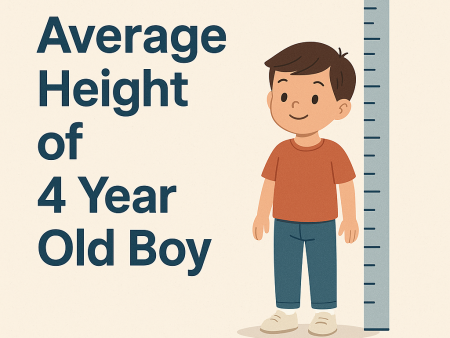Watching a baby grow during their first year is nothing short of amazing. Parents often find themselves wondering if their little one is on track, especially when it comes to milestones like height and weight. Growth patterns can vary, but understanding the average height for a 1-year-old boy gives a helpful reference point.
At this age, boys are busy exploring their world, and their bodies are gr
Average Height for 1 Year Old Boy: Growth Milestones, Tips, and Factors to Consider
Convert your height in m, cm, feet and inches to compare
0' 0" is equal to 0.0 cm or 0.00 m.
Watching a baby grow during their first year is nothing short of amazing. Parents often find themselves wondering if their little one is on track, especially when it comes to milestones like height and weight. Growth patterns can vary, but understanding the average height for a 1-year-old boy gives a helpful reference point.
At this age, boys are busy exploring their world, and their bodies are growing rapidly. While genetics play a big role in determining height, other factors like nutrition and overall health also contribute. Knowing what’s typical can offer peace of mind and help parents celebrate their child’s unique journey.
What Is The Average Height For A 1 Year Old Boy?
At 1 year old, boys typically measure between 28.5 inches and 30.5 inches, according to data from the World Health Organization (WHO). The average height is approximately 29.8 inches. These values represent the 50th percentile, meaning half of boys are taller and half are shorter.
Growth patterns vary, as genetics, nutrition, and health conditions significantly influence height. For example, taller parents often have taller children, while inadequate nutrition can reduce growth potential. Regular pediatric check-ups ensure height measurements align with healthy development norms.
Factors Influencing Height At 1 Year
Several variables affect a 1-year-old boy’s height, including genetics, nutrition, and health status. These factors shape growth differences and determine if a child’s height aligns with healthy norms.
Genetic Factors
Genetic traits inherited from parents largely determine a child’s height potential. Boys with taller parents are often taller themselves, while shorter parents may have shorter children. Family growth patterns, including differences in puberty timing or growth spurts, can also influence height outcomes.
Nutrition And Diet
Nutrition directly impacts growth during early childhood. Diets rich in protein, calcium, and vitamins support bone development and healthy growth. Inadequate nutrition or deficiencies in key nutrients, such as vitamin D, can hinder height progression at this stage.
Health And Growth Conditions
Health conditions can either support or limit growth. Chronic illnesses like celiac disease or hormonal imbalances, such as growth hormone deficiency, can impact a child’s height. Regular health check-ups ensure early identification and management of concerns affecting overall growth.
How To Track Your Baby’s Growth
Monitoring a baby’s growth provides insight into their development and overall health. Using reliable tools and guidance ensures accurate tracking and helps identify potential concerns early.
Understanding Growth Charts
Growth charts, developed by organizations like the WHO, plot a child’s height, weight, and head circumference over time. These charts use percentiles to compare a child’s measurements with others of the same age and sex. For instance, a 1-year-old boy in the 50th percentile for height measures around 29.8 inches, meaning half of boys are shorter and half are taller.
Parents can interpret growth patterns by observing consistency in percentiles rather than focusing on a single measurement. A gradual increase indicates steady growth, while significant drops or spikes may point to underlying issues. Pediatricians often review these charts during wellness visits, ensuring progress aligns with developmental standards.
When To Consult A Pediatrician
Signs like stagnant growth, significant changes in percentiles, or measurements that consistently fall outside typical ranges warrant professional evaluation. Pediatricians assess these concerns through physical exams, detailed growth tracking, and additional tests if needed.
They may explore factors like nutrition, underlying health conditions, or genetic influences to identify reasons for abnormal growth. Early intervention ensures better outcomes, making regular consultations crucial for monitoring a child’s development.
Tips For Supporting Healthy Growth
Healthy growth in 1-year-old boys depends on a combination of factors, including nutrition, sleep, and overall health. Parents can take actionable steps to promote consistent growth milestones.
Encouraging Proper Nutrition
Balanced nutrition plays a key role in supporting a child’s growth. Meals should include protein sources like eggs, chicken, and lentils, which aid muscle development. Calcium-rich foods such as yogurt, cheese, and leafy greens strengthen bones, while whole grains, fruits, and vegetables provide essential vitamins and minerals. Limiting sugary snacks and processed foods helps maintain a healthy diet. If dietary concerns arise, consulting a pediatrician or nutritionist can ensure optimal nutrient intake.
Ensuring Adequate Sleep
Quality sleep is essential for growth since growth hormone production primarily occurs during sleep. A 1-year-old boy typically needs 11-14 hours of sleep per day, including naps. Maintaining a consistent bedtime routine, such as reading or gentle rocking, encourages restful sleep. Avoiding screen time before bed creates a calm environment and enhances sleep quality. Tracking sleep patterns helps identify issues that may affect rest and overall well-being.
Conclusion
Every child grows at their own pace, and understanding the factors that influence growth can help parents feel more confident in their child’s development. While average height measurements provide a helpful reference, they’re just one part of the bigger picture.
By focusing on proper nutrition, regular sleep, and routine health check-ups, parents can support their little one’s growth and overall well-being. Celebrating each milestone, no matter how big or small, makes the journey even more special.
Frequently Asked Questions
What is the average height of a 1-year-old boy?
The average height of a 1-year-old boy is approximately 29.8 inches, according to the World Health Organization (WHO). Height typically ranges from 28.5 inches to 30.5 inches.
What factors influence a 1-year-old boy’s height?
A 1-year-old boy’s height is influenced by genetics, nutrition, and overall health. Genetics determine potential height, while proper nutrition and health conditions can either support or hinder growth.
How can I track my baby’s growth accurately?
You can track your baby’s growth using growth charts from organizations like the WHO. These charts measure height, weight, and head circumference, comparing your child’s data to standard percentiles.
What should I do if my baby isn’t growing as expected?
If your baby’s growth shows stagnation or unusual changes in percentiles, consult a pediatrician. Early intervention can help address any underlying issues effectively.
How does nutrition affect my baby’s height?
Proper nutrition, including protein, calcium, and vitamins, supports healthy bone development. Poor nutrition can hinder growth, so focus on a balanced diet for optimal development.
How much sleep does a 1-year-old need for healthy growth?
A 1-year-old typically needs 11-14 hours of sleep per day, including naps. Proper sleep is essential for overall growth and development.
What is the role of genetics in a child’s height?
Genetics play a significant role in determining a child’s height. Taller parents generally have taller children, while shorter parents may have shorter children.
Are growth patterns the same for all babies?
No, growth patterns vary among babies due to genetics, nutrition, and health. Each child follows an individual growth trajectory, which should be consistently monitored.
How often should I check my baby’s growth?
Growth should be checked regularly during pediatric visits, typically every few months, to ensure the baby meets developmental milestones.
What are some tips for promoting healthy growth in babies?
To support growth, provide a balanced diet with protein and calcium-rich foods, maintain consistent sleep routines, and ensure regular health check-ups. Avoid excessive sugary snacks and promote overall health.





